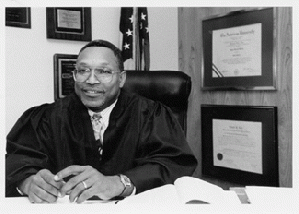The FISA court is a mockery of justice because of John Roberts and the man he appointed to run it, Judge Reggie Walton.
It's a fairly benign article, characterizing Judge Reggie Walton the head of the FISA Court as a tough, no-nonsense judge who tends to give out maximum sentences, and who entered the law to make social change happen. The article observes:
since his appointment to the court in 2007, the FISA Court has dramatically expanded the ability of the federal government to use controversial techniques to gather intelligence on Americans both at home and abroad that have outraged civil libertarians.
Walton serves as the court's public face to the very limited extent that it has one -- typically, in low-grade sparring with Congress. Because the vast majority of the court's rulings are sealed, it is impossible to know which rulings expanding NSA's authority Walton has written. But it is clear that during his time on the court those powers have increased significantly.
My research on Judge Walton before seeing the Buzzfeed article, and even my read of the Buzzfeed article confirms that Judge Walton is bad, bad news for privacy.
First, remember that the Supreme Court Chief Justice appoints FISA judges and so, it was John Roberts who appointed Judge Walton and it was Roberts who named him head of the FISA court. Roberts has proven to be a judge who likes to change the rules and make laws, without legislation. Walton is cut from the same cloth. He told Opednews writer Linn Washington, who wrote a book,
Black Judges On Justice, " "I entered the law because I saw it as a way for social change. "
The Buzzfeed article also says that Walton has no problem with expansion of executive powers, reporting,
Walton has also taken an unsympathetic view towards complaints about the expansion of executive branch authorities during the Obama administration. For instance, in a footnote to his ruling dismissing former Rep. Dennis Kucinich's suit against Obama's decision to assist Libyan rebels, Walton wrote that "While there may conceivably be some political benefit in suing the President and the Secretary of Defense, in light of shrinking judicial budgets, scarce judicial resources, and a heavy caseload, the Court finds it frustrating to expend time and effort adjudicating the relitigation of settled questions of law."
"The Court does not mean to imply that the judiciary should be anything but open and accommodating to all members of society, but is simply expressing its dismay that the plaintiffs are seemingly using the limited resources of this Court to achieve what appear to be purely political ends, when it should be clear to them that this Court is powerless to depart from clearly established precedent of the Supreme Court and the District of Columbia Circuit," he added.
And Judge Walton's
Wikipedia page reports that the Washington Post said, "fellow judges and lawyers who appear before him say Walton's decisions do not appear to be guided by politics but by a tough-on-crime mentality."
I fear that being tough on crime in his position as head of the FISA court could lead to also being tough on the
Fourth Amendment, which used to protect Americans rights to privacy.
But it gets worse. Walton not only feels it is inappropriate for a member of congress to even use the courts to challenge the president, he has also show that he has no respect for the fourth estate-- the media. Wikipedia includes this
excerpt in the Steven Hatfill (anthrax suspect in 2001) case:
On March 30, 2007, US District Judge Reggie Walton issued an order warning Hatfill that he could lose his civil lawsuit over the leaks if he did not compel journalists to name their sources. He gave Hatfill until April 16 to decide whether to press the journalists to give up their sources. [37]
That makes it pretty clear that Walton has no respect for journalist/source confidentiality. I believe that it was this ruling that was a major factor in Chief Justice Roberts appointment of Walton to head the FISA Court. This opinion showed that Walton has no respect for privacy even in one of the most sacrosanct realms. Roberts appointing Walton was like appointing a Fox to guard a henhouse.
The Roberts appointment of Walton also telegraphs us a message that if Edward Snowden ever ends up in court, an appeal to the Supreme court will probably either be rejected, or worse, Chief Justice Roberts will use it to further weaken privacy laws and policies as they currently exist.
There has been some talk about having a member of the Justice department play advocate for the American people when requests are brought to the FISA Court. That person would argue the reasons against approving further spying. But it's just an idea and currently, there is no-one arguing for we the people. That is left up to Judge Walton or one of the other Chief Justice Roberts appointees, who, I doubt will be any more considerate of the privacy interests of average Americans.






